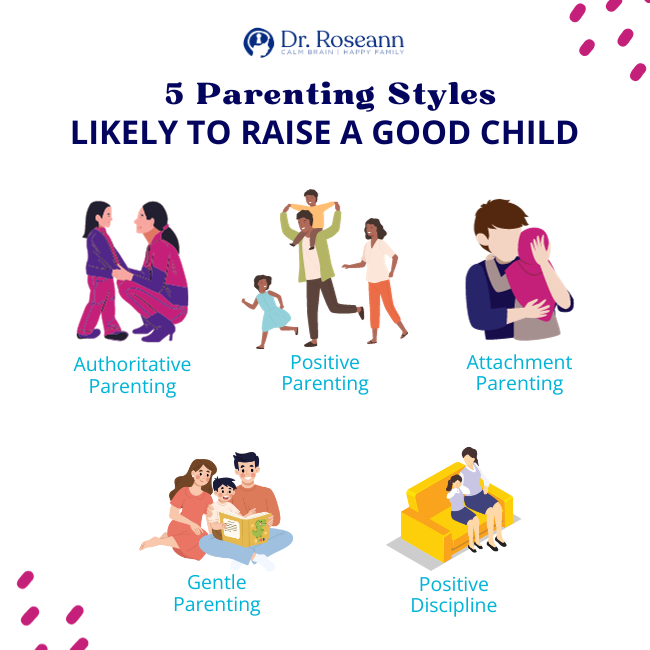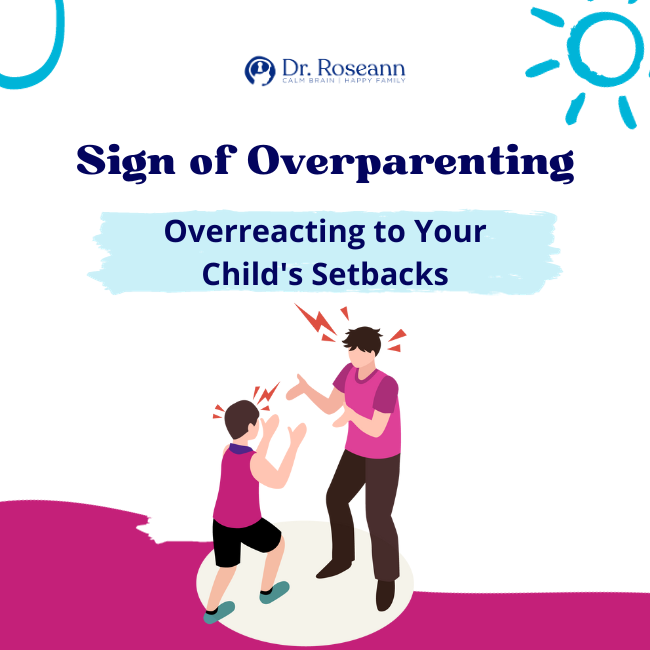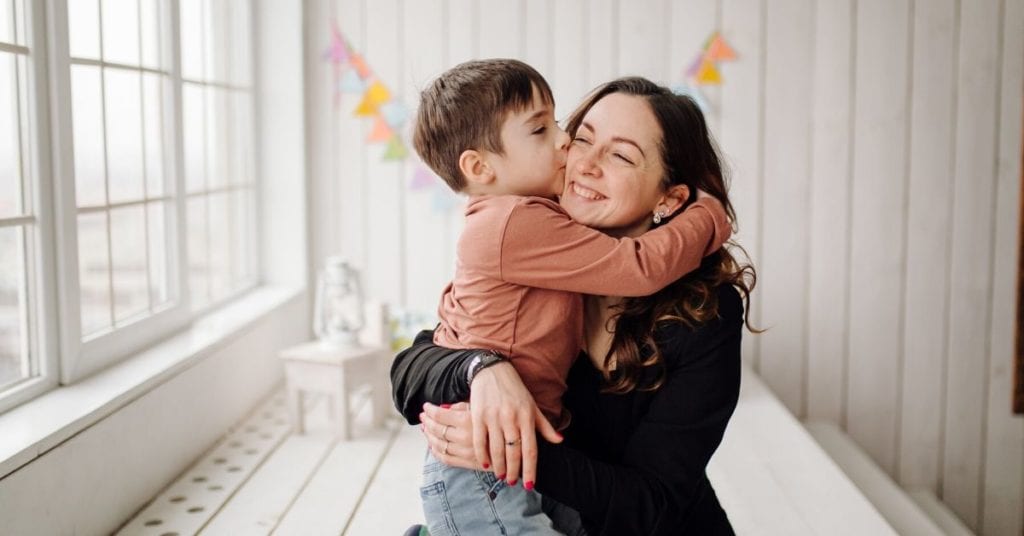Dr. Roseann was included in GMA's article, “Mom Responds to Being Told She ‘Babies' her Son in Viral Post”.
In this article, Dr. Roseann discusses how parenting styles are all different, but it's important to teach stress management to help your child become more independent.
“There are all kinds of parenting and none are bad,” Capanna-Hodge said. “We can't love our children too much.”
“With that in mind, however, she stressed the importance of steering our children toward independence. She equated parenting to coaching.”
“A good coach doesn't always tell you what to do, they cue you to have your response,” Capanna-Hodge told “GMA.” “It's important to teach children stress management tools — deep breaths, backward counts — so they don't become over-reliant.”‘
What are Parenting Styles and Their Effects?
Parenting styles involve various approaches used by parents in raising their children. These styles are defined by the combination of demands and responsiveness observed in parental interactions.
Psychologists have categorized parenting styles into different groups (Kuppens & Ceulemans, 2018), each representing a distinct balance between establishing expectations and expressing warmth.
The impact of these parenting styles on children's development is extensive, influencing aspects such as self-esteem, social competence, and overall emotional well-being. Understanding these diverse parenting styles provides valuable insights into the dynamics of parent-child relationships and their implications for child upbringing.
What are the Four Basic Parenting Styles?
The four basic parenting styles, originally identified by psychologist Diana Baumrind (Fadlillah & Fauziah, 2022), are:
Authoritarian Parenting
Characteristics: High demand, low warmth.
Approach: Authoritarian parents are strict rule-setters who value obedience and discipline. They expect unquestioning compliance from their children and may employ punitive measures for rule violations.
Authoritative Parenting
Characteristics: High demand, high warmth.
Approach: Authoritative parents set clear expectations and rules but also nurture a warm and responsive relationship with their children. They encourage independence, provide explanations for rules, and are open to communication.
Permissive Parenting
Characteristics: Low demand, high warmth.
Approach: Permissive parents are lenient and indulgent, setting few rules and boundaries. They prioritize being responsive to their children's needs and desires, often avoiding confrontation.
Uninvolved or Neglectful Parenting
Characteristics: Low demand, low warmth.
Approach: Uninvolved parents are disengaged and neglectful, providing minimal guidance and emotional support. They may be unaware of or indifferent to their child's needs and activities.
What are the 5 Parenting Styles Likely to Raise a Good Child?

While there's no one-size-fits-all approach, an authoritative parenting style is often considered effective for raising well-adjusted and socially competent children. This parenting style combines high levels of warmth and responsiveness with reasonable demands and expectations. Here are five parenting styles or approaches that are generally associated with positive child outcomes:
Authoritative Parenting
Characteristics: High demand, high warmth.
Approach: Authoritative parents set clear expectations and rules, but they also provide warmth and support. They encourage independence and open communication, fostering a positive and nurturing environment.
Positive Parenting
Characteristics: Focus on positive reinforcement and guidance.
Approach: Positive parenting emphasizes reinforcing positive behaviors through praise and rewards. It involves setting clear expectations while maintaining open communication and avoiding harsh punishments.
Attachment Parenting
Characteristics: Emphasis on creating a strong emotional bond.
Approach: Attachment parenting emphasizes building a close, nurturing connection between parent and child. This approach often involves practices such as responsive caregiving, babywearing, and co-sleeping.
Gentle Parenting
Characteristics: Prioritizes empathy and understanding.
Approach: Gentle parenting focuses on understanding a child's perspective, using empathy in discipline, and avoiding punitive measures. It encourages parents to be responsive and patient.
Positive Discipline
Characteristics: Emphasis on teaching and guiding.
Approach: Positive discipline involves teaching children appropriate behavior through clear communication, setting limits, and providing consequences that are logical and respectful. It aims to foster self-discipline and responsibility.
What are Some Parenting Styles and Mental Health Outcomes to Watch Out For?
Certain parenting styles are more likely to contribute to negative mental health outcomes in children. While it's crucial to recognize that individual variations and other external factors play a role, the following parenting styles have been associated with potential adverse effects on a child's mental health:
Authoritarian Parenting Styles and Discipline
Negative Effects: Authoritarian parenting, characterized by high demands and low warmth, can lead to higher levels of anxiety, lower self-esteem, and difficulties in social relationships for children. The strict rules and lack of emotional support may contribute to feelings of inadequacy and fear of failure.
Permissive Parenting Styles and Emotional Development
Negative Effects: Permissive parenting, with low demands and high warmth, may result in children struggling with impulse control, experiencing behavioral problems, and having challenges with authority figures. The lack of structure and consistent boundaries can lead to difficulties in adapting to rules and expectations outside the family.
Uninvolved or Neglectful Parenting and Stress
Serious Negative Effects: Uninvolved parenting, characterized by low demands and low warmth, poses significant risks to a child's mental health. Children may face emotional and behavioral problems, exhibit lower academic achievement, and be at an increased risk of substance abuse due to the lack of emotional support and guidance.
Overparenting Meaning and Characteristics of Overparenting Parenting Style
Overparenting, or helicopter parenting, is a style characterized by excessive involvement in a child's life, where parents closely monitor and control various aspects, from academics to daily activities.
The approach often centers on an intense focus on the child's achievements, with parents going to great lengths to prevent failure or discomfort. It may involve shielding children from challenges and micromanaging their tasks, which hinders the development of independence and resilience.
While overparenting may stem from well-intentioned efforts to ensure a child's success, it can have detrimental effects (Segrin et al., 2013). Children raised in such an environment may struggle with decision-making and facing challenges independently. They usually lack the opportunity to develop essential life skills.
Overparenting Effects
Overparenting can have various effects on children, impacting their development and well-being in both positive and negative ways. Some potential effects of overparenting include:
1. Dependence
Children raised in an overparenting environment may become overly dependent on their parents for decision-making and problem-solving. This dependence can hinder the development of essential life skills and independence.
2. Reduced Resilience
Overprotected children may struggle to cope with failure or setbacks since they are not given opportunities to experience and learn from challenges. This can lead to a lack of resilience and difficulty in navigating life's inevitable ups and downs.
3. Anxiety and Stress
The pressure to meet high parental expectations and constant monitoring can contribute to increased anxiety and stress levels in children. The fear of failure and the need for constant approval may impact their mental well-being.
4. Perfectionism
Overparenting often emphasizes achievements, which can contribute to the development of perfectionistic tendencies in children. They may feel intense pressure to meet unrealistic standards, leading to stress and self-esteem issues.
5. Limited Decision-Making Skills
Overprotected children may struggle with decision-making since they are not accustomed to making choices and dealing with consequences on their own. It can impact their ability to navigate adult responsibilities later in life.
6. Strained Parent-Child Relationship
While overparenting may stem from a desire to support and protect, it can strain the parent-child relationship. Excessive control and intervention may lead to frustration and a lack of open communication between parents and children.
Signs of Overparenting
Recognizing signs of overparenting is crucial for parents to adjust their approach and foster a healthier parent-child dynamic. Here are common signs of overparenting:
- Micromanaging Tasks
- Avoiding Failure
- Setting Unrealistic Expectations
- Lack of Independence
- Provided Limited Risk-Taking Opportunities
- Overemphasis on Achievements
- Intrusive in Relationships
- Overreacting to Setbacks

- High Levels of Anxiety
- Lack of Personal Responsibility
Over Parenting Consequence: What Can Overprotective Parents Cause?
Overprotective parents can inadvertently cause a range of negative consequences for their children. This parenting style may result in children developing dependency issues and lacking the independence and resilience necessary for adulthood.
Overprotected children may face heightened anxiety and stress due to the constant pressure to meet unrealistic parental expectations, which foster perfectionistic tendencies that can impact their overall well-being.
Additionally, the limited exposure to challenges and decision-making opportunities may hinder the development of effective social skills, potentially leading to difficulties in navigating peer relationships.
Overprotected children may also struggle with forming their own identities and face challenges in adapting to adulthood as they lack the necessary decision-making and problem-solving skills to adapt.
How to Stop Overparenting
To stop overparenting, it's crucial to reflect on your current approach and gradually shift towards a more balanced style. Begin by encouraging age-appropriate independence, allowing your child to take on responsibilities and make decisions.
Promote problem-solving skills by resisting the urge to immediately solve every issue for them and just guiding them to let them learn from both successes and failures. Set realistic expectations for their achievements, avoiding overly high standards that may contribute to anxiety.
Shift your role from controlling every aspect of your child's life to providing support and guidance. Let them explore their interests, face manageable risks, and experience natural consequences for their actions.
Foster open communication to create an environment where your child feels comfortable expressing themselves, and model healthy behaviors by managing stress effectively and acknowledging imperfections.
Seeking professional guidance if needed can provide additional insights and strategies for cultivating a more balanced and supportive parenting style. The goal is to nurture independence and resilience, preparing your child for the challenges and decisions they will encounter in life.
How to Help Parents Who Overstep Boundaries
To assist parents who overstep boundaries, initiate an open and empathetic conversation and emphasize the importance of healthy child development. Share personal experiences to create a relatable connection and provide resources on positive parenting techniques, such as books or workshops.
Encourage autonomy in children. Suggest gradual shifts toward age-appropriate responsibilities. Model healthy interpersonal boundaries in your interactions, and, if needed, gently set boundaries in your interactions.
Celebrate any positive changes, offer emotional support, and recognize the challenges of adjusting parenting styles. Seek professional guidance from parenting experts or therapists for personalized strategies and support tailored to their specific situation.
Approaching the situation with empathy and understanding can help parents recognize the need for change and make positive adjustments in their parenting approach.
Parent Action Steps
☐ Find the balance between setting expectations and expressing warmth in interactions
☐ Recognize specific areas where adjustments to your parenting style may be beneficial.
☐ Educate yourself on the different parenting styles
☐ Pay attention to how your child responds to your parenting style.
☐ Foster open communication with your child to gain insights into your parenting style.
☐ Make gradual changes to your parenting style and incorporate more warmth or flexibility.
☐ Acknowledge and celebrate positive changes in your parenting style.
☐ Explore books, articles, and workshops for valuable insights and guidance.
☐ Be adaptable and responsive to your child's unique needs and temperament.
☐ Strive to create a nurturing and supportive environment.
☐ Download 147 Therapist-Endorsed Self-Regulation Strategies for Children.
Citations
Fadlillah, M., & Fauziah, S. (2022). Analysis of Diana Baumrind’s Parenting Style on Early Childhood Development. AL-ISHLAH: Jurnal Pendidikan, 14(2), 2127–2134. https://doi.org/10.35445/alishlah.v14i2.487
Kuppens, S., & Ceulemans, E. (2018). Parenting Styles: A Closer Look at a Well-Known Concept. Journal of Child and Family Studies, 28(1), 168–181. https://doi.org/10.1007/s10826-018-1242-x
Segrin, C., Givertz, M., Swaitkowski, P., & Montgomery, N. (2013). Overparenting is Associated with Child Problems and a Critical Family Environment. Journal of Child and Family Studies, 24(2), 470–479. https://doi.org/10.1007/s10826-013-9858-3
Are you looking for SOLUTIONS for your struggling child or teen?
Dr. Roseann and her team are all about science-backed solutions, so you are in the right place!
Grab your complimentary copy of
147 Therapist-Endorsed Self-Regulation Strategies for Children: A Practical Guide for Parents
You can get her books for parents and professionals, including It’s Gonna Be OK™: Proven Ways to Improve Your Child’s Mental Health, Teletherapy Toolkit™ and Brain Under Attack: A Resource For Parents and Caregivers of Children With PANS, PANDAS, and Autoimmune Encephalopathy.
If you are a business or organization that needs proactive guidance to support employee mental health or an organization looking for a brand representative, check out Dr. Roseann’s professional speaking page to see how we can work together.
Dr. Roseann is a Children’s Mental Health Expert and Licensed Therapist who has been featured in/on hundreds of media outlets including The Mel Robbins Show, CBS, NBC, PIX11 NYC, Today, FORBES, CNN, The New York Times, The Washington Post, Business Insider, Women’s Day, Healthline, CNET, Parade Magazine and PARENTS. FORBES called her, “A thought leader in children’s mental health.”

She coined the terms, “Re-entry panic syndrome” and “eco-anxiety” and is a frequent contributor to media on mental health.
Dr. Roseann Capanna-Hodge has three decades of experience in working with children, teens and their families with attention-deficit hyperactivity disorder (ADHD), autism, concussion, dyslexia and learning disability, anxiety, Obsessive Compulsive Disorder (OCD), depression and mood disorder, Lyme Disease, and PANS/PANDAS using science-backed natural mental health solutions such as supplements, magnesium, nutrition, QEEG Brain maps, neurofeedback, PEMF, psychotherapy and other non-medication approaches.
She is the author of three bestselling books, It’s Gonna Be OK!: Proven Ways to Improve Your Child's Mental Health, The Teletherapy Toolkit, and Brain Under Attack. Dr. Roseann is known for offering a message of hope through science-endorsed methods that promote a calm brain.
Her trademarked BrainBehaviorResetⓇ Program and It’s Gonna be OK!Ⓡ Podcast has been a cornerstone for thousands of parents facing mental health, behavioral or neurodevelopmental challenges.
She is the founder and director of The Global Institute of Children’s Mental Health, Neurotastic™Brain Formulas and Dr. Roseann Capanna-Hodge, LLC. Dr. Roseann is a Board Certified Neurofeedback (BCN) Practitioner, a Board Member of the Northeast Region Biofeedback Society (NRBS), Certified Integrative Mental Health Professional (CIMHP) and an Amen Clinic Certified Brain Health Coach. She is also a member of The International Lyme Disease and Associated Disease Society (ILADS), The American Psychological Association (APA), Anxiety and Depression Association of America (ADAA) National Association of School Psychologists (NASP), International OCD Foundation (IOCDF).
© Roseann-Capanna-Hodge, LLC 2023










